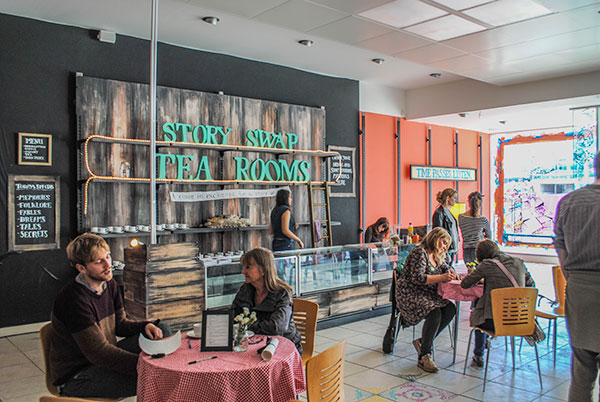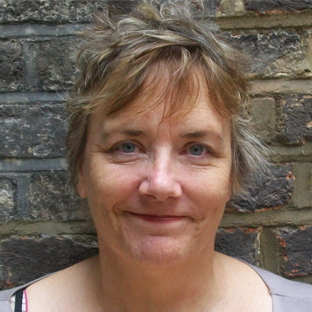Identity with regard to place (either where we live or where we feel we belong) is a primary issue as we, as a nation, navigate the influences and impacts of localism and devolution. Have we lost our sense of belonging or are we simply finding new ways of defining who we are? RSA Associate Jocelyn Cunningham considers the urgency of policy makers to take note of the rich and varied array of socially engaged arts projects under our noses.
The final line in Rowan Moore’s excellent piece in The Observer last Sunday, London: The City That Ate Itself refers to the ‘soft but essential tissue that makes the city worth inhabiting’. I have been mulling over this as I prepare for the upcoming roundtable at the RSA which forms a part of the RSA’s localism work with Wiltshire Council. This phrase ‘soft but essential tissue’ perfectly describes much of the arts work that engages with a place and how people feel about it. Myself and many others often describe this work as the ‘glue’, describe ourselves as ‘connectors’; more formally this work is identified as relational arts practice, socially engaged arts practice or participatory arts practice. It is often commissioned as part of a regeneration agenda or established to develop ‘soft’ consultation methods or indeed, strengthen engagement or a sense of attachment with particular social groups, usually perceived as the traditionally disenfranchised. You will see it in the proliferating numbers of curated walks or the temporary habitation of shops in high streets, much of which also engages with storytelling with residents and shoppers. It is increasingly a part of public health agendas and public engagement strategies within the cultural sector. Sometimes it is even a part of an artwork with no prescribed social intentions and sometimes it is a part of initiatives to widen audience development. It is not necessarily a funded activity; sometimes it is responding to a local need and sometimes it is present in imaginative voluntary activity in choirs and amateur theatre groups. But as you may notice, looking at these examples, some of what they share is the adventure of an imaginary exploration in an everyday place, a sense of shared values concerning where we live, what this means for us and what we want it to be.

Story Swap Tea Rooms, the bare project, Sheffield
The work of developing the ‘soft but essential tissue’ goes way beyond the sense of worth in living where you live. It goes to the very heart of citizenship, working and living alongside others and how we engage with the world. It is about wellbeing, lifelong learning, conflict resolution, bridging and building social capital and well, many of life’s essential needs. Above all, it is not soft, but tackles the very gnarly and challenging circumstances of everyday life. It has the potential to shift the DNA of a place, subtly and from the ground up. But of course, this potential is minimal if the work is perceived as only a means to an end or a ‘nice to have’ in a time of honing back to the essentials.
The RSA event is focusing on identity with regard to place (either where we live or where we feel we belong). I like Etienne Wenger’s definition of identity in this regard: Our identity includes our ability and inability to shape the meanings that define our communities and our forms of belonging.” It seems to me that this is a primary issue as we, as a nation, navigate the influences and impacts of localism and devolution. Have we lost our sense of belonging or are we simply finding new ways of defining who we are? Where is our sense of collective identity now? There are a plethora of superb projects that are answering this. Have a listen to the BBC’s Listening Project currently travelling around the country with a recording booth (or better yet, contribute to it!) Have a look at Storying Sheffield, which gathers a very broad range of stories in a range of creative formats.
Our sense of belonging is decreasing according to the Community Life Survey as is our sense of feeling connected with others elsewhere in the country, a symptom perhaps of devolution itself. So our sense of feeling attached to where we live is decreasing but it is still stronger than feeling attached to others elsewhere in the country. Interestingly, according to an Ipsos Mori poll of last year, we have a growing sense of connection with people in other countries around the world. The Social Issues Research Centre paper on Belonging refers to the public debate on how globalization itself is moving us apart at a local level and that our notions of belonging are changing.
Matthew Taylor, in a blog earlier this year, recognised an ‘identity gap at the heart of place shaping’ and how we have a need to engage citizens in ‘identifying what they value about where they live and what they want to preserve even as the pace of change accelerates.’ Why is the identity of a place limited to a superficial and falsely positive image that is driven by economic benefits and the tourist economy? Identity is not something a marketing team dreams up but what is already present in the hearts, minds and experiences of the people who are there and this is complex and not always positive. How we respond to a place has love/hate components as a matter of course. I know. I live in London. Is there not an opportunity here to consider how to link the rich and nuanced benefits of place based arts work with the profound need to address more citizen-led public services?
I am not suggesting that more of this kind of work is commissioned (although that would clearly be a good idea) but that we notice that it is happening already. It might be for other purposes but I don’t think this matters – it is less about the purpose or intended outcomes and more about the urgency to notice that this is happening, relationships are being developed that cross generations, sectors, socio-economic boundaries; they are often clumsy and fragile and certainly not available to appropriate for other agendas. And this work is growing. It is this making of soft, essential tissue which goes beyond project boundaries and which we must take note of and build upon. If, as Matthew Taylor suggests in Don’t Take, Make!, the political class needs to shift its assumptions about power and social change, then the failure of imagination is a critical thing to address. We have a plethora of riches at a local level to be noticing.
Related articles
-
Blog: Shifting the Narrative of Local
Jocelyn Cunningham
Last month the RSA, as part of the People Shaped Localism programme, hosted a roundtable entitled The Felt Local: arts based approaches to belonging and identity. RSA Associate Jocelyn Cunningham reflects on the insights from the roundtable regarding perceptions of what local means and who this includes.


Join the discussion
Comments
Please login to post a comment or reply
Don't have an account? Click here to register.
A good read, Jocelyn thanks. Clearly something very important is happening as regards to how we identify and use space. I suppose the question is whether this change will reinforce inequality or whether there is a real opportunity for a step change towards more inclusive and creative communities?
Hope the discussion goes well, do keep me in the loop and perhaps we could have a chat sometime about some space(s) we are looking to develop in Bristol?
Very Best, David